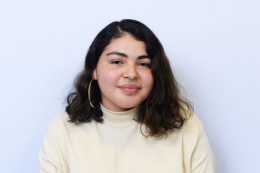
In the wake of Hurricane Maria, it’s apparent to me that many U.S. citizens don’t know much about the island of Puerto Rico. Facebook conversations and supportive posts still lack the historical context that surrounds it. Without that, the full magnitude of the situation is not felt. Most people just know the basics: all power was knocked out, people can’t get clean water, communications are down and full power won’t be restored for another six to eight months.
President Donald Trump declared a state of emergency the next day. That same night, he traveled to his golf course in New Jersey and stayed for the weekend.
The first officials arrived in Puerto Rico five days after it was hit. When Trump arrived, he told the people they’re lucky it wasn’t “a real catastrophe like Katrina” and threw paper towel rolls out into a crowd like they were on a game show.
The vast majority of people I know are angered by Trump’s actions, his harsh words about the mayor of San Juan and his statement that Puerto Ricans just expect help to be handed to them. Many asked, why aren’t the people of Puerto Rico being treated the same as hurricane victims in the United States?
While it’s great that people see the problem in the government’s response, this is nothing new. The United States has always neglected, excluded and exploited the island.
Puerto Rico is an unincorporated territory of the United States. This already shows a part of the neglect I’m referring to. This status means the U.S. Constitution, and all that it provides to the American people, only partially applies to Puerto Ricans. Right off the bat, Puerto Ricans are treated as second-class American citizens.
So, how is Puerto Rico treated differently than the states?
Despite the fact that the U.S. Congress has full jurisdiction over it, Puerto Rico does not have a voting representative. This means that Congress makes decisions that affect Puerto Rico, but Puerto Rico does not have a say.
In the same vein, though the president of the United States is also their president, U.S. citizens who reside in Puerto Rico cannot vote in national elections. The 3.5 million Puerto Rican people do not have a say in who becomes their president. Again, they have no voice in selecting their own leader, whose actions will affect them and their home.
Then there’s the Jones Act, which Trump temporarily waived eight days after the storm to help the victims. Formally called the Merchant Marine Act of 1920, it says all vessels that sail in U.S. waters must be U.S.-built, U.S.-flagged and 75 percent U.S.-crewed. Puerto Rico is restricted to U.S. shipping only, which is the most expensive in the world according to Illinois Representative Luis Gutiérrez.
In short, the Jones Act drives up shipping prices that then get passed on to consumers. The result is imported goods are more expensive in Puerto Rico, increasing the cost of living for the sake of profiting the U.S. shipping and shipbuilding industry. Members of Congress urged the waiving of the act in this relief effort because it made it harder to access food, medicine and other emergency supplies being brought by ships.
There are numerous examples that all tell the same story. I haven’t even touched on the United States’ role in the debt crisis and controlling the island’s leadership. The United States has taken Puerto Rico’s land and resources while tossing its people to the side.
The issue doesn’t have a simple solution. Puerto Ricans, myself included, are split on what to do. Puerto Rico has voted multiple times on the issue of statehood, and the most recent results showed the people were overwhelmingly in favor of it. However, only 23 percent of registered voters showed up to vote.
On one hand, Puerto Rico could become a state, which would grant the citizens more rights and could help with the debt crisis. Others advocate for their independence, eliminating the United States’ hold on the people but leaving them to take on a plethora of problems, such as solving the debt crisis on their own, that they’re not equipped to deal with.
I don’t know the answer. While I would love to see Puerto Rican independence, we cannot be ignorant of the problems that could follow.
All that needs to be clear is that the United States has always neglected Puerto Rico. It didn’t start with Trump, and it won’t end with him. American citizens should be educated on the ways in which our government disenfranchises people. We, as college students, need to keep using our voices and hold the government accountable. Student protest has a long history in the United States. After all, if people love this country so much, they should acknowledge its faults and strive for something better.
And we can start by ending the modern-day colonization of Puerto Rico.
Sarah Molano is a junior majoring in English.


